新目标浙江中考英语二轮复习语法篇--形容词与副词(共25张PPT)
文档属性
| 名称 | 新目标浙江中考英语二轮复习语法篇--形容词与副词(共25张PPT) |  | |
| 格式 | pptx | ||
| 文件大小 | 2.4MB | ||
| 资源类型 | 试卷 | ||
| 版本资源 | 人教新目标(Go for it)版 | ||
| 科目 | 英语 | ||
| 更新时间 | 2021-05-25 15:11:54 | ||
图片预览



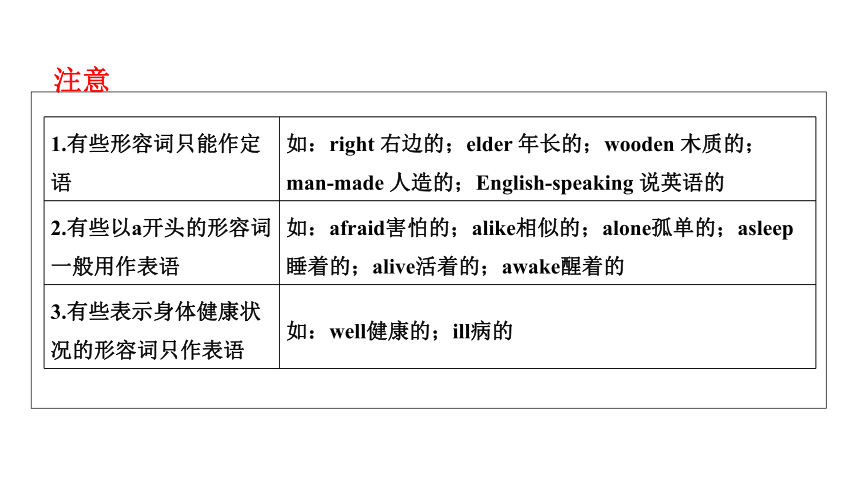
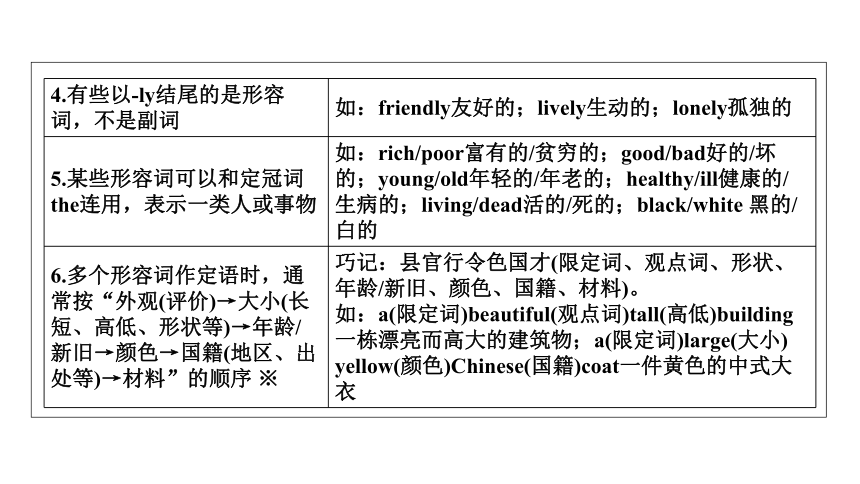
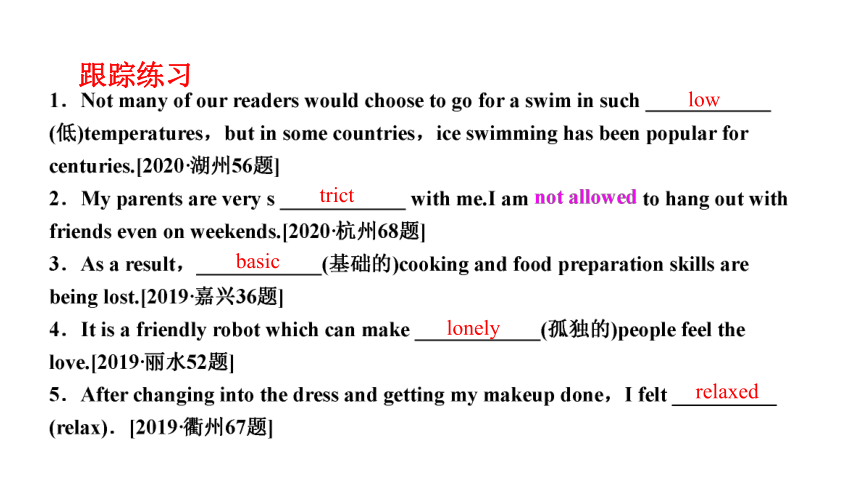
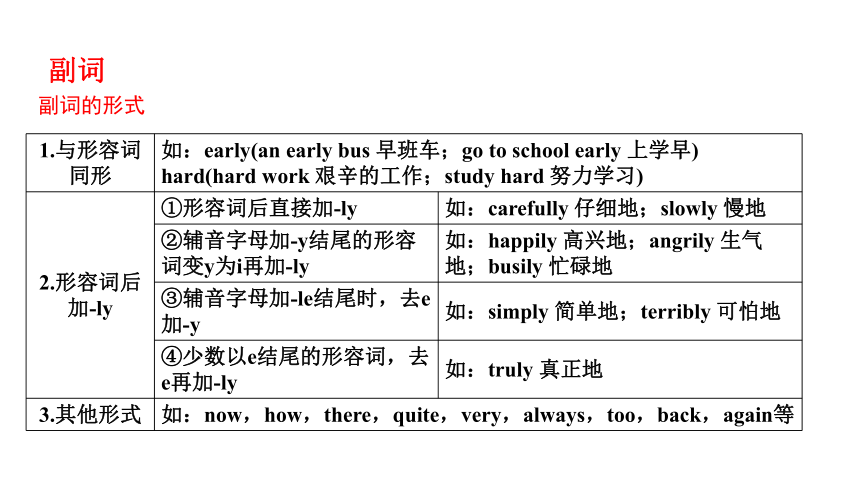
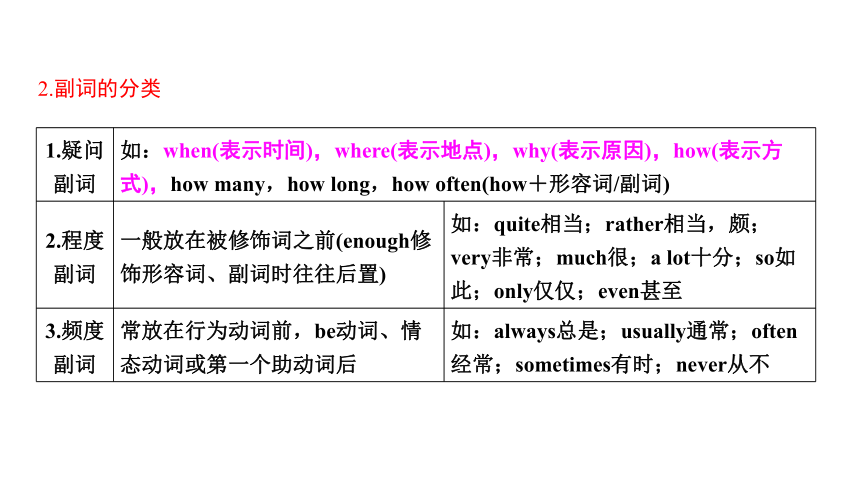
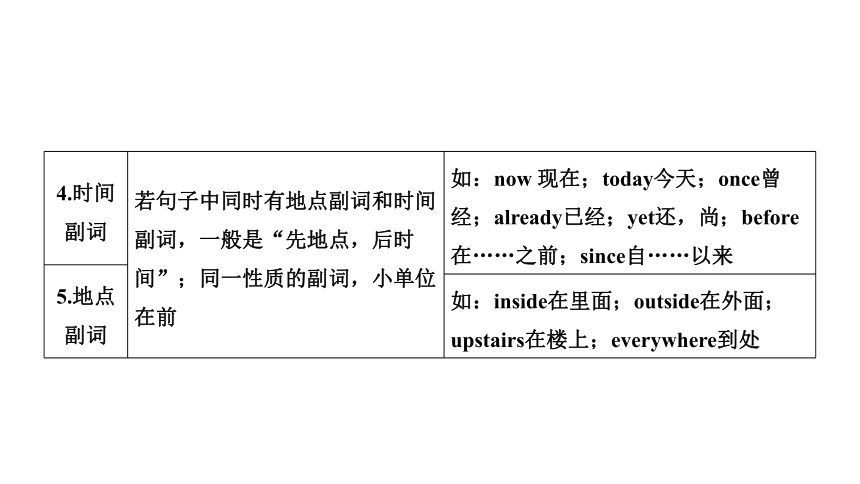
文档简介
中考二轮复习
语法篇
形容词与副词
1.作定语
①单个形容词作定语时,通常前置,但修饰由no及不定代词any,some和every构成的复合词时,通常后置
如:He is a good boy.他是一个好男孩。
Our history teacher tells us something interesting about India.
历史老师告诉了我们关于印度的一些有趣的事情。
②形容词短语作定语时一般后置
如:The basket full of fruits belongs to the boy.装满水果的这个篮子是属于这个男孩的。
形容词的用法
1.作定语
③else修饰不定代词或疑问代词时,需要后置
如:What else did he say?他还说了些什么?
④“基数词?可数名词单数?形容词”为复合形容词,放在被修饰的名词前※
如:Tom is an eight?year?old boy.
汤姆是一个八岁的小男孩。
2.作表语
形容词作表语时,与系动词连用构成系表结构
如:He is alone in the city.He feels very lonely.
他一个人在这座城市里,感到很孤单。
3.作宾语补足语
形容词作宾语补足语时,用来说明宾语的性质、状态或特征
如:I found the book interesting.我发现这本书很有趣。
1.有些形容词只能作定语
如:right 右边的;elder 年长的;wooden 木质的;man?made 人造的;English?speaking 说英语的
2.有些以a开头的形容词一般用作表语
如:afraid害怕的;alike相似的;alone孤单的;asleep睡着的;alive活着的;awake醒着的
3.有些表示身体健康状况的形容词只作表语
如:well健康的;ill病的
注意
4.有些以?ly结尾的是形容
词,不是副词
如:friendly友好的;lively生动的;lonely孤独的
5.某些形容词可以和定冠词the连用,表示一类人或事物
如:rich/poor富有的/贫穷的;good/bad好的/坏
的;young/old年轻的/年老的;healthy/ill健康的/生病的;living/dead活的/死的;black/white 黑的/白的
6.多个形容词作定语时,通常按“外观(评价)→大小(长短、高低、形状等)→年龄/新旧→颜色→国籍(地区、出处等)→材料”的顺序 ※
巧记:县官行令色国才(限定词、观点词、形状、年龄/新旧、颜色、国籍、材料)。
如:a(限定词)beautiful(观点词)tall(高低)building 一栋漂亮而高大的建筑物;a(限定词)large(大小) yellow(颜色)Chinese(国籍)coat一件黄色的中式大衣
low
trict
basic
lonely
relaxed
跟踪练习
副词的形式
1.与形容词同形
如:early(an early bus 早班车;go to school early 上学早)
hard(hard work 艰辛的工作;study hard 努力学习)
2.形容词后加?ly
①形容词后直接加?ly
如:carefully 仔细地;slowly 慢地
②辅音字母加?y结尾的形容词变y为i再加?ly
如:happily 高兴地;angrily 生气
地;busily 忙碌地
③辅音字母加?le结尾时,去e加?y
如:simply 简单地;terribly 可怕地
④少数以e结尾的形容词,去e再加?ly
如:truly 真正地
3.其他形式
如:now,how,there,quite,very,always,too,back,again等
副词
2.副词的分类
1.疑问副词
如:when(表示时间),where(表示地点),why(表示原因),how(表示方
式),how many,how long,how often(how+形容词/副词)
2.程度副词
一般放在被修饰词之前(enough修饰形容词、副词时往往后置)
如:quite相当;rather相当,颇;very非常;much很;a lot十分;so如此;only仅仅;even甚至
3.频度副词
常放在行为动词前,be动词、情态动词或第一个助动词后
如:always总是;usually通常;often经常;sometimes有时;never从不
4.时间副词
若句子中同时有地点副词和时间副词,一般是“先地点,后时
间”;同一性质的副词,小单位在前
如:now 现在;today今天;once曾
经;already已经;yet还,尚;before在……之前;since自……以来
5.地点副词
如:inside在里面;outside在外面;upstairs在楼上;everywhere到处
3.副词的用法
1.作状语
①修饰动词,一般位于动词之后
如:You should do the work carefully.
你们应该认真工作。
②修饰形容词或其他副词,一般放在形容词或其他副词之前
如:I felt quite bitter about it at the time.
当时我对这件事感到相当怨愤。
③修饰整个句子,一般位于句首
如:Luckily,we both love football.
幸好我们俩都爱足球。
2.作表语
主要指主语的方向、方位、动作情况
如:I'll be back in five minutes.我五分钟内就回来。
3.作定语
表示时间或地点的副词,可以作定语,一般要后置
如:Most of the people here know each other.
这里大多数人互相认识。
4.作补语
主要说明宾语或主语所处的位置、状态
如:I saw her out with her friends.
我看见她跟她的朋友一起出去了。
together
carefully
①The old movies we watched ____________ brought back many sweet memories of ours.
②For example,Anxi and Hangzhou are ____________ known for their tea. [2019·宁波47题]
③The zipper?Is it ____________ such a great invention?[2018·宁波47题]
④Sally is such a careful girl that she ____________ makes spelling mistakes. [2018·嘉兴31题]
recently
widely
really
seldom
1.形容词、副词比较等级的变化规则
1.规则变化
①一般单音节词和少数双音节词
加?er,?est
如:tall→taller→tallest
clever→cleverer→cleverest
few→fewer→fewest
②以e结尾的单音节词
加?r,?st
如:late→later→latest
large→larger→largest
③以重读闭音节结尾,且末尾只有一个辅音字母的词
先双写词尾的辅音字母,再加?er,?est
如:big→bigger→biggest
thin→thinner→thinnest
hot→hotter→hottest
形容词、副词的比较等级
1.规则变化
④以“辅音字母+y”结尾的词
改y为i,再加
?er,?est
如:easy→easier→easiest
happy→happier→happiest
⑤两个或两个以上音节的词
在词前加more,most
如:useful→more useful→most useful
expensive→more expensive→most expensive
2.不规则变化
good/well→better→best bad/badly/ill→worse→worst many/much→more→most
little→less→least old→older(年龄)/elder(辈分)→oldest/eldest
far→farther(距离)/further(程度)→farthest/furthest
2.形容词、副词比较等级的常考句型
1.原级
①A=B
as+原级+as,意为“和……一样”
如:He is as strong as a horse.他力大如牛。
②A≠B
not+as/so+原级+as,意为“不如……”
如:The people here are not as/so friendly as there.这里的人不如那里的人友好。
2.比较级
①比较级+than,意为“前者比后者……”
如:Your English is better than his.
你的英语比他的要好一些。
②the+比较级…,the+比较级
…,意为“越……越……”
如:The higher the ground is,the thinner the air becomes.离地面越
高,空气就越稀薄。
③比较级+and+比较级,意为
“越来越……”
如:More and more people are moving to the cities.越来越多的人移居到了城市。
④the+比较级+of the two…,意为“两个……中较为……的一个”
如:Do you know the taller of the two boys?
你认识这两个男孩中较高的那一个吗?
2.比较级
⑤特殊疑问词+be+比较级,A or
B?,意为“哪一个更……”
如:Which ball is bigger,the blue one or the red one?哪个球更大,蓝色的还是红色的?
⑥数词+times+比较级+than,意为“比……更……”
如:This room is three times bigger than that one.这间房的面积比那间大两倍。
⑦比较级+than any other+单数可数名词=比较级+than+the other+复数可数名词,意为“比其他任何一个都……”
如:China is larger than any other country in Asia.=China is larger than the other countries in Asia.
中国比其他任何一个亚洲国家都
大。
3.最高级
①the+最高级+可数名词单数+in/of短语,意为“……中最……的”
如:Tom is the tallest boy of all.
汤姆是所有男孩中个子最高的。
②one of the+最高级+可数名词复数+of/in/among短语,意为“最……的……之一”
如:He is one of the most handsome boys in my class.他是我们班最帅的男孩之一。
③the+序数词+最高级+可数名词单数+in短语,意为“第……最……”
如:Dongting Lake is the second largest freshwater lake in China.洞庭湖是中国第二大淡水湖。
④特殊疑问词+be+the+最高级,
A,B or C?意为“哪一个最……”
如:Which is the biggest,the
sun,the moon or the earth?太
阳、月亮和地球哪一个最大?
1.修饰形容词、副词原级的词(组)有:really,very,so,too,quite,a little,rather,pretty。
2.修饰形容词、副词比较级的词(组)有:much,far,a lot,a little/bit,still,even。
3.副词的最高级前可以不加the;最高级前已有人称代词的所有格、名词的所有格形式或指示代词等修饰语时,不用加冠词。
注意
lowest
harder
easier
arlier
taller
happier
best
https://www.21cnjy.com/help/help_extract.php
语法篇
形容词与副词
1.作定语
①单个形容词作定语时,通常前置,但修饰由no及不定代词any,some和every构成的复合词时,通常后置
如:He is a good boy.他是一个好男孩。
Our history teacher tells us something interesting about India.
历史老师告诉了我们关于印度的一些有趣的事情。
②形容词短语作定语时一般后置
如:The basket full of fruits belongs to the boy.装满水果的这个篮子是属于这个男孩的。
形容词的用法
1.作定语
③else修饰不定代词或疑问代词时,需要后置
如:What else did he say?他还说了些什么?
④“基数词?可数名词单数?形容词”为复合形容词,放在被修饰的名词前※
如:Tom is an eight?year?old boy.
汤姆是一个八岁的小男孩。
2.作表语
形容词作表语时,与系动词连用构成系表结构
如:He is alone in the city.He feels very lonely.
他一个人在这座城市里,感到很孤单。
3.作宾语补足语
形容词作宾语补足语时,用来说明宾语的性质、状态或特征
如:I found the book interesting.我发现这本书很有趣。
1.有些形容词只能作定语
如:right 右边的;elder 年长的;wooden 木质的;man?made 人造的;English?speaking 说英语的
2.有些以a开头的形容词一般用作表语
如:afraid害怕的;alike相似的;alone孤单的;asleep睡着的;alive活着的;awake醒着的
3.有些表示身体健康状况的形容词只作表语
如:well健康的;ill病的
注意
4.有些以?ly结尾的是形容
词,不是副词
如:friendly友好的;lively生动的;lonely孤独的
5.某些形容词可以和定冠词the连用,表示一类人或事物
如:rich/poor富有的/贫穷的;good/bad好的/坏
的;young/old年轻的/年老的;healthy/ill健康的/生病的;living/dead活的/死的;black/white 黑的/白的
6.多个形容词作定语时,通常按“外观(评价)→大小(长短、高低、形状等)→年龄/新旧→颜色→国籍(地区、出处等)→材料”的顺序 ※
巧记:县官行令色国才(限定词、观点词、形状、年龄/新旧、颜色、国籍、材料)。
如:a(限定词)beautiful(观点词)tall(高低)building 一栋漂亮而高大的建筑物;a(限定词)large(大小) yellow(颜色)Chinese(国籍)coat一件黄色的中式大衣
low
trict
basic
lonely
relaxed
跟踪练习
副词的形式
1.与形容词同形
如:early(an early bus 早班车;go to school early 上学早)
hard(hard work 艰辛的工作;study hard 努力学习)
2.形容词后加?ly
①形容词后直接加?ly
如:carefully 仔细地;slowly 慢地
②辅音字母加?y结尾的形容词变y为i再加?ly
如:happily 高兴地;angrily 生气
地;busily 忙碌地
③辅音字母加?le结尾时,去e加?y
如:simply 简单地;terribly 可怕地
④少数以e结尾的形容词,去e再加?ly
如:truly 真正地
3.其他形式
如:now,how,there,quite,very,always,too,back,again等
副词
2.副词的分类
1.疑问副词
如:when(表示时间),where(表示地点),why(表示原因),how(表示方
式),how many,how long,how often(how+形容词/副词)
2.程度副词
一般放在被修饰词之前(enough修饰形容词、副词时往往后置)
如:quite相当;rather相当,颇;very非常;much很;a lot十分;so如此;only仅仅;even甚至
3.频度副词
常放在行为动词前,be动词、情态动词或第一个助动词后
如:always总是;usually通常;often经常;sometimes有时;never从不
4.时间副词
若句子中同时有地点副词和时间副词,一般是“先地点,后时
间”;同一性质的副词,小单位在前
如:now 现在;today今天;once曾
经;already已经;yet还,尚;before在……之前;since自……以来
5.地点副词
如:inside在里面;outside在外面;upstairs在楼上;everywhere到处
3.副词的用法
1.作状语
①修饰动词,一般位于动词之后
如:You should do the work carefully.
你们应该认真工作。
②修饰形容词或其他副词,一般放在形容词或其他副词之前
如:I felt quite bitter about it at the time.
当时我对这件事感到相当怨愤。
③修饰整个句子,一般位于句首
如:Luckily,we both love football.
幸好我们俩都爱足球。
2.作表语
主要指主语的方向、方位、动作情况
如:I'll be back in five minutes.我五分钟内就回来。
3.作定语
表示时间或地点的副词,可以作定语,一般要后置
如:Most of the people here know each other.
这里大多数人互相认识。
4.作补语
主要说明宾语或主语所处的位置、状态
如:I saw her out with her friends.
我看见她跟她的朋友一起出去了。
together
carefully
①The old movies we watched ____________ brought back many sweet memories of ours.
②For example,Anxi and Hangzhou are ____________ known for their tea. [2019·宁波47题]
③The zipper?Is it ____________ such a great invention?[2018·宁波47题]
④Sally is such a careful girl that she ____________ makes spelling mistakes. [2018·嘉兴31题]
recently
widely
really
seldom
1.形容词、副词比较等级的变化规则
1.规则变化
①一般单音节词和少数双音节词
加?er,?est
如:tall→taller→tallest
clever→cleverer→cleverest
few→fewer→fewest
②以e结尾的单音节词
加?r,?st
如:late→later→latest
large→larger→largest
③以重读闭音节结尾,且末尾只有一个辅音字母的词
先双写词尾的辅音字母,再加?er,?est
如:big→bigger→biggest
thin→thinner→thinnest
hot→hotter→hottest
形容词、副词的比较等级
1.规则变化
④以“辅音字母+y”结尾的词
改y为i,再加
?er,?est
如:easy→easier→easiest
happy→happier→happiest
⑤两个或两个以上音节的词
在词前加more,most
如:useful→more useful→most useful
expensive→more expensive→most expensive
2.不规则变化
good/well→better→best bad/badly/ill→worse→worst many/much→more→most
little→less→least old→older(年龄)/elder(辈分)→oldest/eldest
far→farther(距离)/further(程度)→farthest/furthest
2.形容词、副词比较等级的常考句型
1.原级
①A=B
as+原级+as,意为“和……一样”
如:He is as strong as a horse.他力大如牛。
②A≠B
not+as/so+原级+as,意为“不如……”
如:The people here are not as/so friendly as there.这里的人不如那里的人友好。
2.比较级
①比较级+than,意为“前者比后者……”
如:Your English is better than his.
你的英语比他的要好一些。
②the+比较级…,the+比较级
…,意为“越……越……”
如:The higher the ground is,the thinner the air becomes.离地面越
高,空气就越稀薄。
③比较级+and+比较级,意为
“越来越……”
如:More and more people are moving to the cities.越来越多的人移居到了城市。
④the+比较级+of the two…,意为“两个……中较为……的一个”
如:Do you know the taller of the two boys?
你认识这两个男孩中较高的那一个吗?
2.比较级
⑤特殊疑问词+be+比较级,A or
B?,意为“哪一个更……”
如:Which ball is bigger,the blue one or the red one?哪个球更大,蓝色的还是红色的?
⑥数词+times+比较级+than,意为“比……更……”
如:This room is three times bigger than that one.这间房的面积比那间大两倍。
⑦比较级+than any other+单数可数名词=比较级+than+the other+复数可数名词,意为“比其他任何一个都……”
如:China is larger than any other country in Asia.=China is larger than the other countries in Asia.
中国比其他任何一个亚洲国家都
大。
3.最高级
①the+最高级+可数名词单数+in/of短语,意为“……中最……的”
如:Tom is the tallest boy of all.
汤姆是所有男孩中个子最高的。
②one of the+最高级+可数名词复数+of/in/among短语,意为“最……的……之一”
如:He is one of the most handsome boys in my class.他是我们班最帅的男孩之一。
③the+序数词+最高级+可数名词单数+in短语,意为“第……最……”
如:Dongting Lake is the second largest freshwater lake in China.洞庭湖是中国第二大淡水湖。
④特殊疑问词+be+the+最高级,
A,B or C?意为“哪一个最……”
如:Which is the biggest,the
sun,the moon or the earth?太
阳、月亮和地球哪一个最大?
1.修饰形容词、副词原级的词(组)有:really,very,so,too,quite,a little,rather,pretty。
2.修饰形容词、副词比较级的词(组)有:much,far,a lot,a little/bit,still,even。
3.副词的最高级前可以不加the;最高级前已有人称代词的所有格、名词的所有格形式或指示代词等修饰语时,不用加冠词。
注意
lowest
harder
easier
arlier
taller
happier
best
https://www.21cnjy.com/help/help_extract.php
同课章节目录
- 词法
- 名词
- 动词和动词短语
- 动词语态
- 动词时态
- 助动词和情态动词
- 非谓语动词
- 冠词
- 代词
- 数词和量词
- 形容词副词及其比较等级
- 介词和介词短语
- 连词和感叹词
- 构词法
- 相似、相近词比较
- 句法
- 陈述句
- 一般疑问句和否定疑问句
- 特殊疑问句及选择疑问句
- 反意疑问句
- 存在句(There be句型)
- 宾语从句
- 定语从句
- 状语从句
- 主谓一致问题
- 简单句
- 并列句
- 复合句
- 主谓一致
- 主、表语从句
- 名词性从句
- 直接引语和间接引语
- 虚拟语气
- 感叹句
- 强调句
- 倒装句
- 祈使句
- 句子的成分
- 句子的分类
- 题型专区
- 单项选择部分
- 易错题
- 完形填空
- 阅读理解
- 词汇练习
- 听说训练
- 句型转换
- 补全对话
- 短文改错
- 翻译
- 书面表达
- 任务型阅读
- 语法填空
- 其他资料
